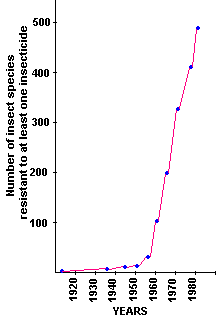Probably not.
Without the predation there would have been no selection. There
would be no advantage to blending into the background. The light
coloured moths would have survived and reproduced just as well
as the melanistic moths.
These two scenarios highlight the two driving forces of evolution
- inheritance - in this case the gene(s) for colour.
- selection - in this case predation.
In our first scenario we considered a situation where the colour
of the individuals was outside the influence of the genes. Getting
covered in soot is not inherited.
In our second scenario we considered a situation where the population
was not being selected. Without predators there would have been
no selection against light coloured moths.
Genetics (genes) and Ecology (selection) are fundamental to Natural Selection (evolution).
[I like to think of it as Genetics + Ecology = Evolution.]
There are other examples of man's unintentional selection.
In 1939 the chemical DDT (dichloro-diphenyl-trichloroethane) was
discovered to be a potent nerve poison to insects. It was introduced
immediately as a means of fighting insects and its use spread
during and after World War Two.
Initially, DDT was a highly effective insecticide but a few individuals
in each population had a slightly different enzyme in their nervous
system and those few individuals escaped death.
|
Within a few years of DDTs introduction in Denmark there were
already examples of houseflies resistant to it. Facing no competition
from the others who had died, the DDT-resistant flies bred freely
and they soon became the dominant type of housefly.
DDT resistance occurred not only in flies and not only in Denmark.
Resistance to this chemical evolved in many different insects
in all parts of the world where DDT was used.
It seems that the gene for resistance to DDT was always in the
populations of many insects. All that was needed was the selection
to make those individuals more successful in reproducing. By killing
off their non-resistant competition, DDT selected for insects
that were able to survive the poison and those resistant flies
passed their resistant genes to their offspring.
Nearly 500 species of insects had evolved resistance to DDT since it was introduced 50 years ago.
| 
|
Insects are particularly good at evolving quickly because there
are so many individuals in a population. Any individual might
have the gene that is under selection and, therefore, have an advantage.
There is another form of life that is even more numerous than
insects and they too have evolved defences against our chemicals.
Can you name those microscopic organisms that doctors fight every
day with chemicals?
Once you have an answer in mind, continue on.
This work was created by Dr Jamie Love  and
and  licensed under a Creative Commons Attribution-ShareAlike 4.0 International License.
licensed under a Creative Commons Attribution-ShareAlike 4.0 International License.
If you like, you can return to the Home Page.

 and
and  licensed under a Creative Commons Attribution-ShareAlike 4.0 International License.
licensed under a Creative Commons Attribution-ShareAlike 4.0 International License.